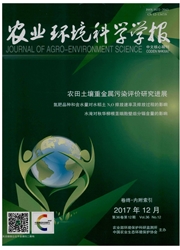

 中文摘要:
中文摘要:
生物质炭(Bio-char,BC)是生物质低温热解生成的含碳产物,近年来,在碳封存和土壤修复领域有着广泛的应用。进入土壤的黑碳会强烈改变疏水性有机污染物的吸附行为。采用恒温振荡平衡吸附法研究了生物质炭及硝酸氧化生物质炭(OBC)对非疏水的两性农药(毒莠定)的吸附行为,研究了在pH及苯污染共存影响下,毒莠定的吸附规律。结果表明:在不同平衡pH条件下,毒莠定的吸附能力表现为pH1.3〉pH2.9〉pH5.0,即低pH值条件有利于对毒莠定的吸附;硝酸改性使得BC的比表面积减少了53.7%,同时表面酸性基团有所增加(41.0%),碱性基团有所降低(69.2%),这导致生物质炭吸附能力显著下降;在苯污染物共存情况下,BC及OBC对毒莠定的吸附量均有所降低,且苯对BC较对OBC的影响更为显著。
 英文摘要:
英文摘要:
Bio-char(BC),a carbon-rich material arising from the pyrolysis of biomass under the low temperature,was widely used in carbon sequestration and soil amendment.BC may strongly change the adsorption of hydrophobic organic pollutants in soils.In the present study,batch adsorption experiments were conducted to study the adsorption of the amphoteric pesticide(picloram) on BC and its oxidized product(OBC) at different pH with and without benzene.It showed that picloram adsorption on BC and OBC at pH1.3 was higher than at pH2.9 and pH5.0.The modification of BC resulted in the decrease of surface area(53.7%) and the surface alkaline groups(69.2%),as well as the increase of the surface acid groups(41.0%).Therefore,the evidently reduced adsorption was found on OBC.The adsorption of picloram on BC and OBC decreased in the presence of benzene from aqueous solutions.Moreover,the effect of benzene on BC is more significant than on OBC.
 同期刊论文项目
同期刊论文项目
 同项目期刊论文
同项目期刊论文
 期刊信息
期刊信息
